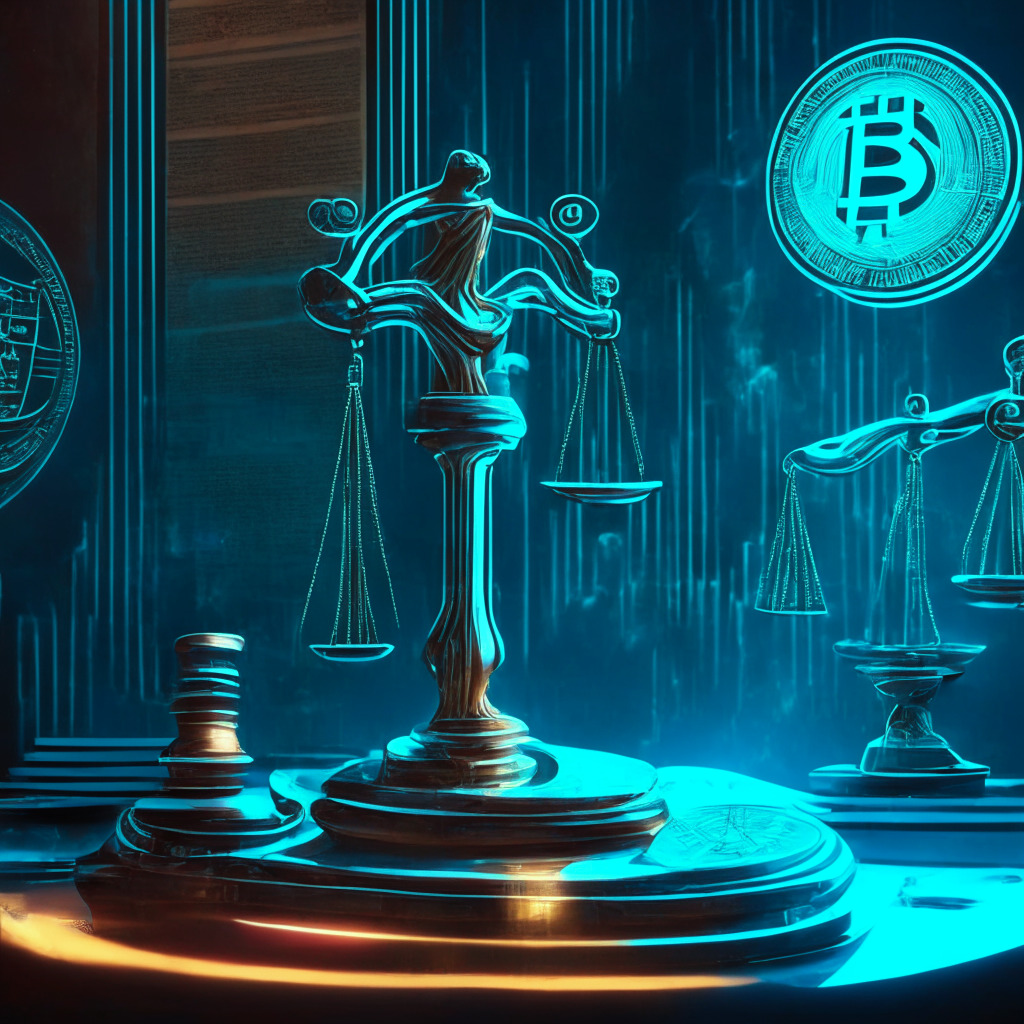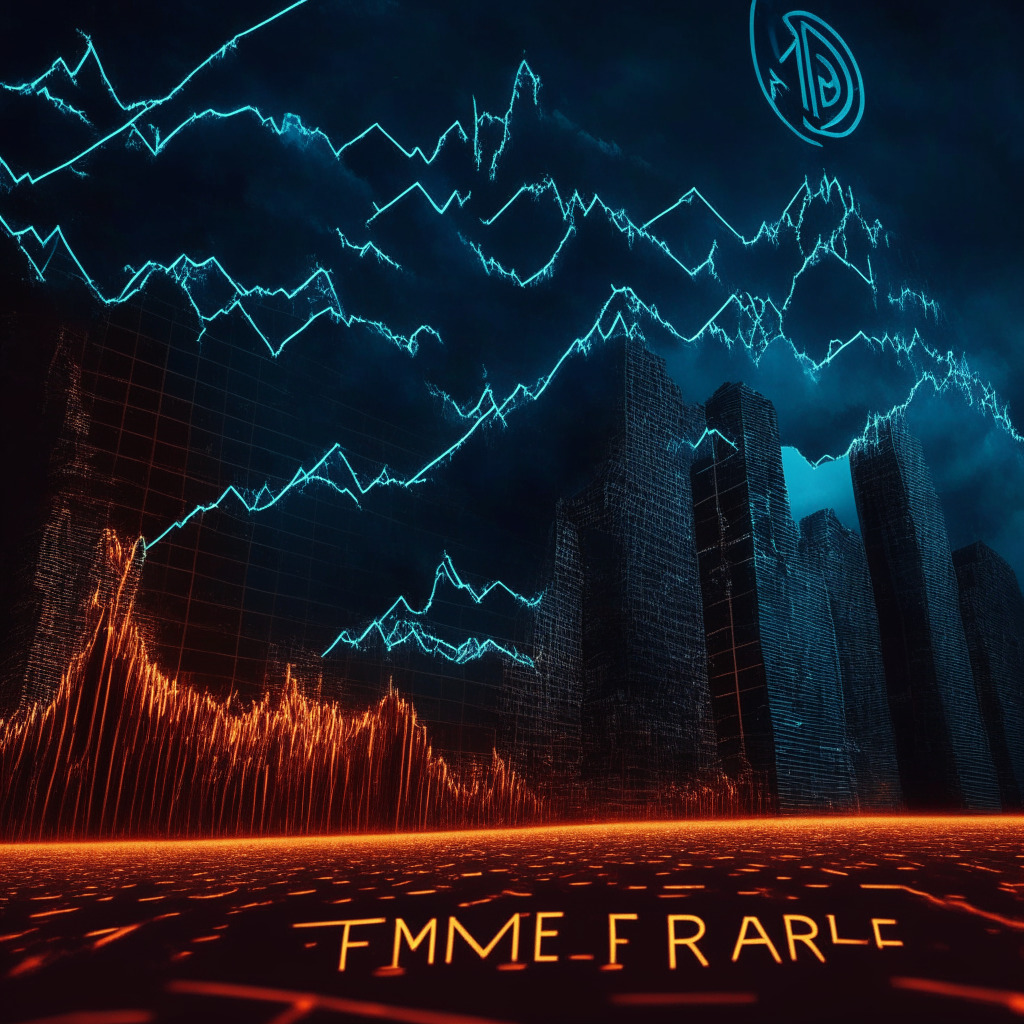US Congressman Warren Davidson opposes the expanding realm of Central Bank Digital Currency (CBDC), viewing them as tools for coercion and control. Davidson’s proposal would criminalise the creation and implementation of any CBDCs, likening them to a “financial equivalent of the Death Star.” CBDCs, according to Davidson, threaten the future of digital assets and could infringe upon citizen privacy.
Search Results for: Warren Davidson
Grayscale’s Victory Stirs Up Controversy: Doubts Over SEC’s Gensler Heighten
“Cryptocurrency circles discuss Grayscale’s lawsuit and SEC chair Gary Gensler’s role. Congressman Warren Davidson suggests Gensler’s SEC decisions lack stead, as demonstrated by Grayscale’s legal victory. This opens up possibilities for a Bitcoin spot ETF emergence in the US, but the situation remains uncertain.”
Stablecoin Policy Disputes: A Milestone or Impediment for Crypto Regulation?
“The Clarity for Payment Stablecoins Act (H.R. 4766) negotiations spark political debate. While some view this potential legislation as crucial for cryptocurrency regulation, others express concern about rushed decisions, lack of oversight, and regulatory dissonance. Rep. Warren Davidson’s ‘Keep Your Coins Act’ also enters the conversation, aiming to protect individual’s self-custodied crypto wallets.”
Federal Reserve’s CBDC Hunt: A Financial Death Star or Leap Towards Progress?
“The San Francisco Federal Reserve Bank’s job posting for a “senior crypto architect” has sparked criticism. There are concerns CBDCs could be misused as tools for coercion and control. Representatives like Warren Davidson contend CBDCs should prioritize being a stable store of value and an efficient means of exchange, rather than being used for surveillance and control.”
Rally Against CBDCs: Freedom Fighters or Innovation Obstructors?
U.S. Republican Representative, Warren Davidson, has appealed to Congress to ban Central Bank Digital Currencies (CBDCs), equating their creation to “building the financial equivalent of the Death Star.” Davidson argues that CBDCs convert money into a tool for coercion and control, rather than a stable store of value. Counterarguments maintain that CBDCs represent the natural evolution of digitizing finance. The debate underscores the need for well-regulated, informed approaches to digital finance’s future.
SEC Scrutiny Intensifies: Crypto’s Critical 36-Hours and Prometheum’s Mysterious Emergence
The crypto market recovers amid discussions on the SEC’s scrutiny of the industry and lawsuits against Coinbase and Binance. Rep. Warren Davidson announces a new SEC reform bill, while Prometheum gains attention for its compliance, receiving a first-of-its-kind SPBD approval for digital asset securities.
SEC Stabilization Act: Restructuring SEC and Crypto Regulation Controversy Unfolds
Republican congressmen Warren Davidson and Tom Emmer have filed the SEC Stabilization Act, aiming to restructure the SEC and remove Chairman Gary Gensler, citing concerns over his governance of the crypto market. The legislation seeks to provide clearer and more consistent oversight for American investors and the crypto industry, amid concerns of a detrimental impact on the market and potential migration of the industry overseas.
SEC Stabilization Act: Restructuring the Agency & Dismissing Gensler Amid Crypto Tensions
US Congressman Warren Davidson announced the SEC Stabilization Act, aiming to restructure the agency and dismiss Chair Gary Gensler amid criticism over his approach to crypto market regulation. The ongoing Ripple lawsuit highlights tensions between the SEC and the XRP community, with investors and the industry calling for clear oversight.
Congressmen Challenge CEA’s Crypto Stance: Innovation vs Consumer Protection Debate
U.S. Congressmen Warren Davidson and Mike Flood express concerns over the Council of Economic Advisers’ negative stance on digital assets, arguing it may displace innovation and economic growth. They advocate for a regulatory framework supporting innovation while maintaining essential protections and question the dismissal of digital asset benefits in the recent Economic Report of the President.
Divisive Lines: How SEC’s Gensler Grapples with Criticisms & Questions on Crypto Oversight
Gary Gensler, SEC Chair, recently faced criticism over cryptocurrency market monitoring. Critics accused him of stifling markets with excessive regulation, promoting a “woke” agenda, and lacked certainty in classifying Bitcoin. The future of cryptocurrency regulation remains a divisive topic among industry participants and lawmakers.
Battleground CBDC: A Bipartisan Struggle Shaping Cryptocurrency’s Future in the U.S.
The House Financial Services Committee introduced three bills halting the Federal Reserve’s considerations towards a Central Bank Digital Currency (CBDC). Republicans expressed fears over the potential impact on traditional banking and the suspense it could cast on the stablecoin market. Democrats, however, pushed for continued CBDC exploration, reminding of its potential benefits in global economic competition. The Federal Reserve reaffirmed its cautious approach towards CBDC, emphasizing concerns over a stablecoin issuance without federal control.
CBDC Anti-Surveillance State Act: Preserving Financial Privacy in the Age of Digital Currencies
U.S. Representative Tom Emmer, with the support of 49 other Republican representatives, reintroduced the CBDC Anti-Surveillance State Act to prevent unjust financial surveillance through retail central bank digital currencies (CBDCs). Advocates contend such government-sanctioned currency must respect financial privacy, individual freedom, and market competitiveness.
Navigating Crypto Regulations: The CBDC Anti-Surveillance State Act and the Privacy Debate
“Regulation of cryptocurrencies and the blockchain technology is a pressing topic, with concerns about privacy and government surveillance. The ‘CBDC Anti-Surveillance State Act’, reintroduced by Rep. Tom Emmer, aims to limit unelected authorities in issuing a central bank digital currency (CBDC), fearing it could be used as surveillance resources.”
Assessing the Impact of Newly Proposed US Blockchain Regulation Bill
Senior House Republicans proposed a bill called the “Financial Innovation and Technology for the 21st Century Act.” The legislation aims to define “blockchain” and “digital asset” in financial laws, clarify the roles of the CFTC and SEC in cryptocurrency oversight, and establish clear guidelines for classifying digital assets. Despite some opposition, it has substantial backing due to its dual objective of consumer protection and promoting innovation.
Gary Gensler, SEC, and the Crypto Conundrum: US vs EU Regulations and the Battle Ahead
SEC Chair Gary Gensler faces criticism for his broad approach to cryptocurrencies, causing venture capital investment in the U.S. crypto industry to decline compared to the European Union. The EU’s MiCA legislation acknowledges utility tokens, providing a clear framework for digital assets. New legislation is needed in the U.S. to address the definition of securities and digital asset regulation.
SEC vs Binance.US Showdown: Unearthing Past Statements and Facing New Legislation
The U.S. SEC’s intention to freeze Binance.US’s assets faced a setback as Judge Amy Berman Jackson advised bilateral negotiations. Meanwhile, HKMA urges banks to accept crypto exchanges as clients, and the European Parliament passes the EU Artificial Intelligence Act, impacting governance of AI technologies.
SEC Stabilization Act vs Gensler’s Future: Analyzing Impacts on Crypto Markets and ETFs
The SEC Stabilization Act seeks to fire SEC Chair Gary Gensler and redistribute power within the agency, while BlackRock applies for the first spot Bitcoin ETF in the U.S. Amidst these developments, the crypto market continues to evolve and face uncertainties, highlighting the importance of staying informed.
Crypto Market Recovering Amid Regulatory Tensions: Binance vs SEC and CBDC Evaluations
The crypto market shows signs of recovery as the U.S. inflation rate cools and the Fed abstains from raising interest rates. Leading cryptocurrencies report nominal gains, while Binance faces legal battles with the SEC. Key events this week include discussions on central bank digital currencies and support for a draft bill to regulate cryptocurrencies, indicating that regulatory debates play a crucial role in shaping the future of the crypto market.
SEC’s Controversial Rule Sparks Debate: Impact on Digital Asset Industry and Struggle for Balance
A group of Republican lawmakers criticized a proposed SEC rule, arguing it could shut down the digital asset industry’s development. They expressed concerns that the rule, potentially expanding the definition of an exchange, would capture various individuals, including software developers and blockchain network participants. The controversy highlights the growing consensus on the necessity of a clear legal framework within the cryptocurrency space.
Crypto Volatility Persists: FOMC Pause, SEC Charges, and Future Rate Hikes
The crypto market remains volatile following the June 14 FOMC announcement pausing rate hikes, affecting Bitcoin price. Muted crypto price action potentially reflects lingering effects of SEC charges against Binance and Coinbase. While interest rate hikes are paused, regulation remains a major threat, with SEC enforcement actions increasing and investor sentiment remaining low.
Binance.US vs SEC: Asset Freeze Debate and Its Impact on Crypto Regulation
Binance.US resists the SEC’s request to freeze assets, arguing it would cripple their business and impact customers. Amidst allegations of disregarding US securities laws, Binance.US maintains that US customer assets are safe. The ongoing legal battle highlights the challenge of balancing investor protection with fostering crypto industry innovation.
Binance.US Enlists Ex-SEC Official Amid Legal Trouble: Impact on Crypto Industry
Binance.US enlists former SEC enforcement co-director George Canellos to tackle a lawsuit alleging its status as an unregistered securities exchange. The exchange faces legal action from the SEC, with potential consequences including frozen assets and halted operations.
The Battle to Remove SEC’s Gensler: Legal Complexities and Crypto Community Backlash
U.S. lawmakers introduced the SEC Stabilization Act, intending to fire SEC Chair Gary Gensler over allegations of misconduct and abuse of power. However, removing an independent agency official is legally complex, involving criteria like inefficiency, neglect of duty, or malfeasance. The act could restructure the SEC and shift authority among commissioners.
SEC Crackdown on Crypto: Protecting Consumers or Stifling Innovation?
SEC Chairman Gary Gensler claims the crypto industry’s business model is “built on non-compliance” and highlights actions taken against prominent exchanges like Coinbase and Binance. Critics argue stricter regulations could hinder innovation in the largest global economy.
Soaring Blockchain Transaction Fees: Market Indicator for Bitcoin’s 2023 Boom?
Bitcoin’s rising popularity has led to increased blockchain transaction fee revenue, suggesting potential for new heights in 2023. The surge in fees reflects growing demand and adoption of cryptocurrencies for financial transactions. Analysts and investors monitor the market for Bitcoin’s upward trajectory, with recent milestones driven by factors such as the US debt ceiling deal and a stronger US dollar.
Crypto Miners Dodge Tax Bullet in US Debt Ceiling Deal: Pros, Cons, and Main Conflict
The latest U.S. debt ceiling bill draft potentially eliminates a proposed 30% tax on electricity used by cryptocurrency miners, as part of President Biden’s FY2024 budget. The legislation, aiming to prevent a government debt default, still needs congressional approval.
Crypto Mining Tax Shelved: Balancing Innovation, Regulation, and Sustainability Debate
The proposed Digital Asset Mining Energy excise tax (DAME) on cryptocurrency mining is absent from the recent US debt ceiling deal, stirring debates. While proponents argue DAME could generate revenue and promote eco-friendly practices, critics warn against stifling the growing industry with taxes.
Debt Ceiling Agreement Blocks Crypto Mining Tax: A Win for the Industry or Environmental Setback?
The recent U.S. debt ceiling agreement has notably blocked the proposed Digital Asset Mining Energy (DAME) excise tax, preventing a 30% tax imposition on cryptocurrency mining firms. This outcome, seen as a victory for the crypto industry, has sparked debates around the environmental impact of crypto mining operations and the importance of addressing energy consumption concerns for a sustainable future.
Debt Ceiling Deal Blocks Crypto Mining Tax: Boon or Bane for the Industry and Environment?
President Joe Biden and House Representative Kevin McCarthy reached a tentative debt ceiling deal that, if passed, would block the proposed 30% tax on crypto miner’s electricity bills. Critics argue the blocked tax denies encouragement for sustainable energy practices in the crypto mining industry, while proponents view it as a victory for maintaining competitiveness.
Stablecoin Regulation Debate: Balancing State vs. Federal Control for Innovation & Security
The House Committee on Financial Services’ new Subcommittee on Digital Assets, Financial Technology, and Inclusion debated two proposed bills for stablecoin regulation, highlighting the need for a balance between state and federal control. The ongoing discussion emphasizes finding a suitable middle ground that fosters innovation and guarantees stakeholders’ best interests.
US House Committee Seeks Crypto Clarity Amid SEC Contradictions and Offshore Exodus
The U.S. House Financial Services Committee aims to clarify digital asset regulations amid contradictory actions from SEC Chair Gary Gensler. As U.S.-based crypto firms consider moving offshore due to regulatory crackdowns, upcoming hearings will address regulatory gaps and potential coordinated efforts by regulators for “Operation Choke Point 2.0” to de-bank the crypto market.
CBDCs: Political Hot Potato or Wave of the Future? Debating the Pros and Cons
Central bank digital currencies (CBDCs) have sparked political debates, with critics arguing they could lead to surveillance and control of citizen transactions. Over 100 countries are developing CBDCs, and the ongoing debate could impact research and development, potentially limiting the sharing of results.































